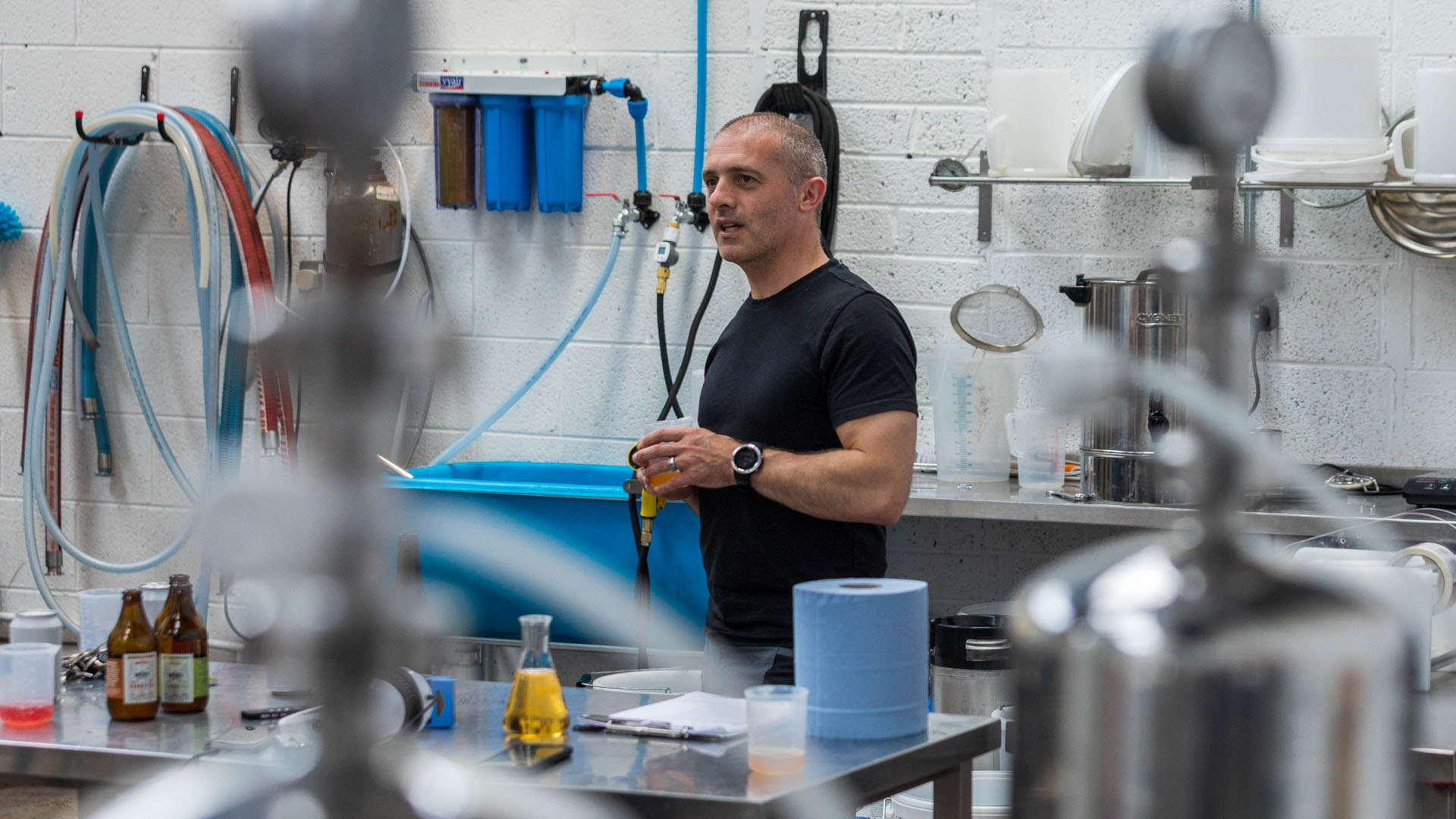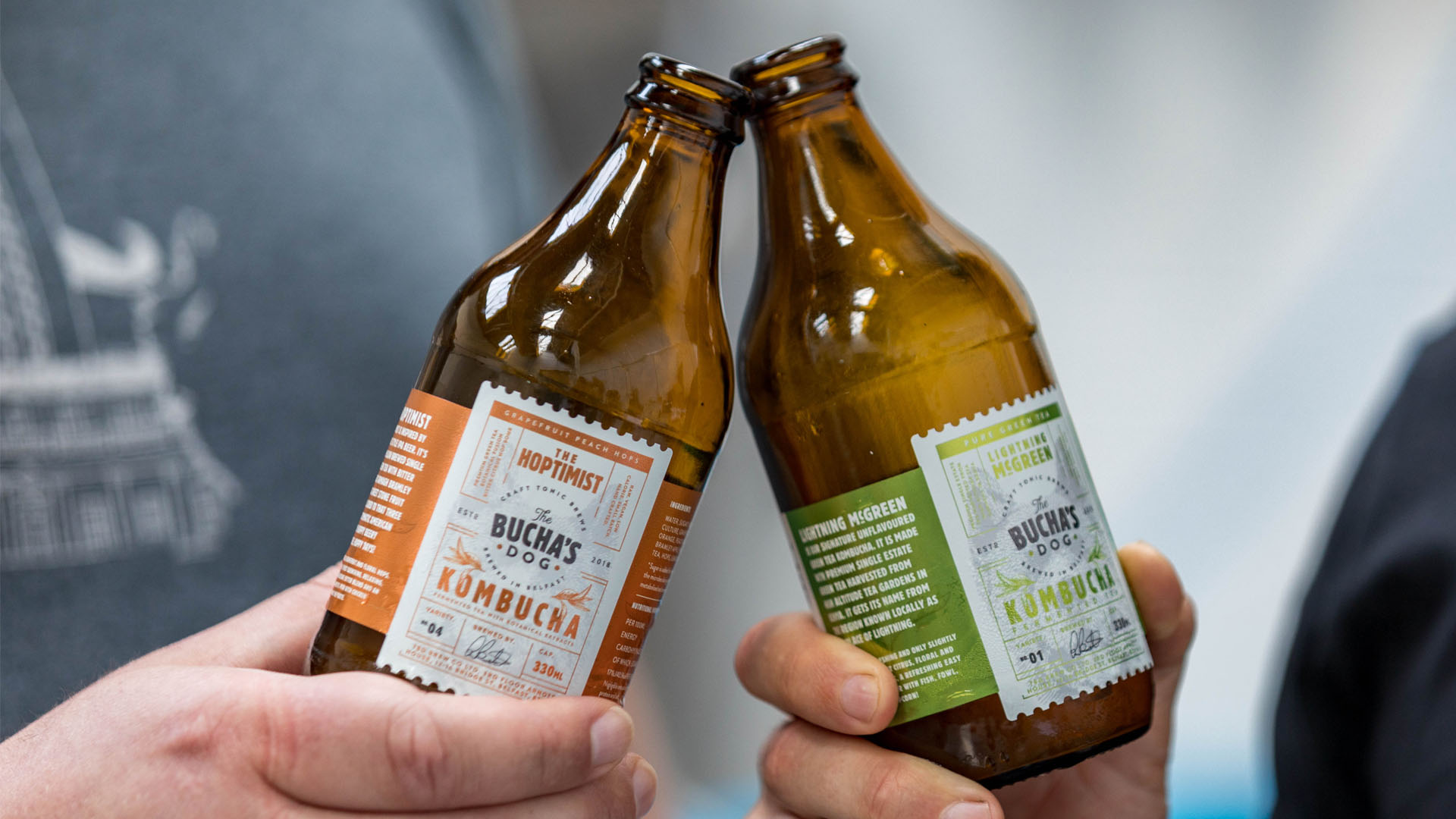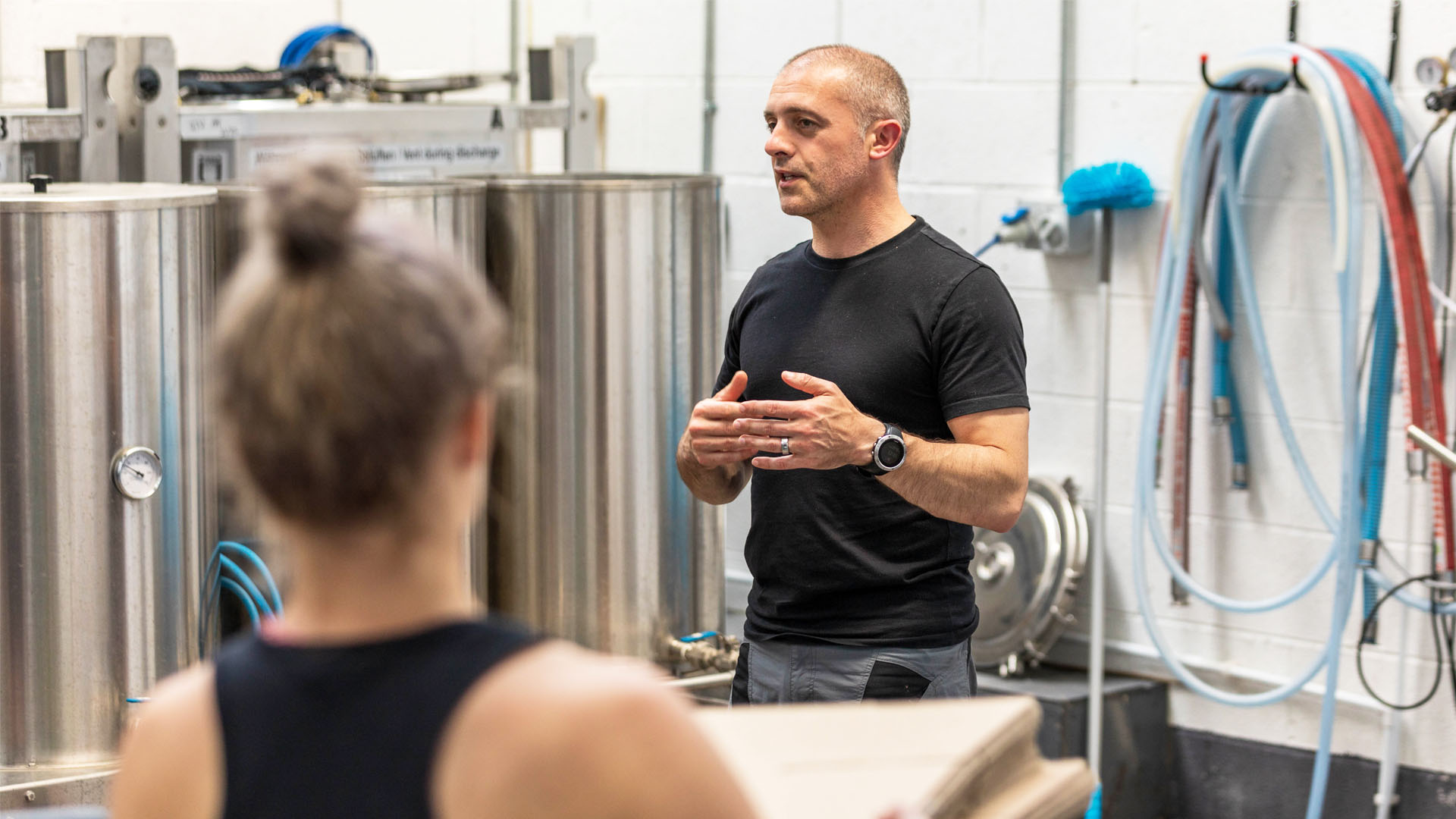Our first series explores how local chefs, restauranteurs, artisans, brewers and distillers are crafting some of the best food and drink you may or may not have heard of, furthering Northern Ireland’s culinary scene and adapting to serve local communities over the pandemic period.
You can never get a cup of tea large enough or a book long enough to suit me.
C.S. Lewis
Northern Ireland has long been defined by tea. It gets us through just about everything life throws at us and defines some of our happiest moments. It is US.
This is also what ties us to so many other world cultures. Virtually every society has some sort of herb, leaf, bark or fruit that is steeped in hot water and serves a multitude of purposes. Kombucha is one such, all-purpose, beverage that, thus far, hasn’t been prominent in Northern Ireland, but is likely to become a prominent compliment alongside the traditional tea culture we’re most proud of.
As we were treated to beaker after beaker of this magical stuff by Owner, Peter Barrett, he discussed his ‘mad scientist-like’ process of making kombucha, which we found lifting ourselves closer to Nirvana – or at least enjoying the healthiest buzz we’ve ever had!
This is the story of Bucha’s Dog:
What exactly is kombucha?
Kombucha is a fermented, lightly effervescent, sweetened black or green tea drink commonly consumed for its health benefits. It’s native to Manchuria in China, where it’s been used for medicinal purposes for centuries. It has found a big market in various developed countries over the last decade.
Kombucha is actually a vinegar – that’s where it gets its distinct taste and smell and is more familiar to locals than one might think. It is a tea vinegar. The whole process is concerned with getting it to the point where it’s not too ‘vinegary’. The tea contributes to the flavour, but you don’t actually taste tea, in the traditional sense. If you cut vinegar down into something that’s more palatable, like a carbonated drink, it’s very refreshing, and it’s one of the best ways of stimulating your digestion.
It is serves as a great aperitif and accompanies food well. It also contains about a half cup of coffee’s worth of caffeine. It’s versatile, giving you a lift alongside the calming effect of tea, while bolstering your health.
How has Bucha’s Dog evolved?
So, I’ve been going business-wise since 2018. We were first featured in the Twilight Market. We developed the name from the saying, “As fit as a butcher’s dog” and it just stuck.
Initially, we received polarised responses from the industry. On one hand, people were like, “I’ve never heard of this – this isn’t tea!”
On the other hand, others were saying, “Hallelujah, we’ve got a local kombucha company!”
A lot of ‘yogis’ are into kombucha and have drank it while travelling abroad. Though it started out as a niche market, we found out very quickly that there’s people actively looking for it. We’re the only ones in NI making it!
I think our approach paid off because it was casual in the beginning – I just made what I like to drink and that evolved over time into something more. Eventually we’d like to expand across the island.
Why kombucha?
I really just started brewing it for myself at home and then friends and family started to catch on. I got into it because my background is in biology. I’m a geek!
My interest, specifically, was in tea. It’s fascinating discovering where different teas are produced, for what purposes and with what ingredients. For me, having a plant science background, it’s the botany that drew me to kombucha.
I was looking for a healthy and natural solution to indigestion. The doctors at that time were trying to prescribe me antacids, but that wasn’t working. Kombucha is really good for digestion and it balances your PH system.
Kombucha brewing combines all the things I’m interested in – plant biology, tea production and fermentation. So, it was a nice hobby that turned into something more.
Tell us about your flavours.
We have six core kombucha flavours. We’re experimenting with several other teas, too, at any one time. We’re also moving from bottling to some canning for retail.
We have the original, ‘Lightning McGreen’ – which is really light, floral and citrusy. All the flavour is coming naturally from the culture that is developed through the brewing process.
We’ve got the ‘The Hoptimist’ – it’s got the same hops as you’d find in any IPA, so we’ve got the hipsters on lockdown. ‘Assamson & Goliath’ is our signature unflavoured black tea Kombucha made with a blend of Assam and Kenyan black teas.
Our ‘Hibitual Drinker’ contains hibiscus, raspberry and rose head – it really packs a punch. It’s full of organic acids, like apple cider vinegar. It’s great for your health and as a refreshment. Cross-fitters are going wild over it.
‘The Haymaker’ is inspired by the old-time energy drink Haymaker’s punch that once quenched and energised workers in the fields. It’s brewed from a special blend of green and black tea with local orchard apples, lemon and just enough ginger to pack a punch.
‘Like a Boss’ – the ‘guys one’ – is similar to a Rooibos Tea; it’s not actually from a tea plant. It’s South African and it’s very characteristic of the place – it’s masculine and very woody and leathery. It has some baobab, which is an African super fruit, which also gives it some citrusy elements to it.
What are some of the things you’re experimenting with at the moment?
We’re developing a couple of South American teas – a ‘Yerba mate’ kombucha with red chili and pineapple in it and our ‘Paro Darko’, which is actually made from a bark scraped off of a particular tree. We really wanted to highlight South America’s most prominent teas, as they are so integral to many of the cultures down there.
We have recently partnered with the ‘Craft Tea Cat’ to create the ‘Craft Tea Co.’ Together with them, we’ve created a line of fermented, sparkling teas. It gives people another option who may not be into the funkier, kombucha side of things and it’s greatly expanded us into other types of tea-making and experimentation.
Do you think kombucha can have a positive influence on local tea culture?
The two things – established Irish tea culture and kombucha – may, at first, seem at odds. You look at other cultures, like China and Japan, where you have ‘everyday teas’ and teas for ceremonial occasions. This contrasts greatly with our ‘builder’s brew’ tea culture. I want to get more into that side of things and create a more modern tea society. It would be great to see tea and kombucha bars where people come together and try new things.
We will fight anyone that may want to label us as ‘fancy’. People are getting quite pretentious about coffee, tea and beer, as if they’re self-appointed ‘sommeliers’ in those categories. We’re not about that. We just want to create a great product that appeals to people across the spectrum. We want people to enjoy flavours they are traditionally accustomed to while serving it to them through perhaps a different medium.
So, have you been to places like China or India to become immersed in Tea Cultures?
The ironic thing is, I’ve never been to China. I haven’t been to places like India or South America either, even though we use many of their traditional teas in our brews. This is the next step for me. As I’ve said, I came to this from a scientific background. I travelled the states where kombucha and yerba mate (pronounced ‘mah-tay’) have really emerged onto the scene and I want that here. I wanted something to challenge drink menus and tea time everywhere and that’s what originally got me into this – so many drink menus are so boring.
I think travelling to places where tea is truly revered and has contributed to the development of civilisation will elevate what we’re doing to the next level. Many of the Asian cultures are quite process-oriented, so I think we will have ton to exchange. No doubt, I will be the one doing most of the learning.
Ironically, the first kombucha I ever tried was my own. I have since collected a ton of tea paraphernalia, much to my wife’s disgust!
Tell us about how it’s made…
It’s similar to making wine. A good analogy is the brewing process is like an aerobic system – it breathes and you can smell the yeast. It takes technology and know-how. You have to feel out the techniques of brewing for a long time before you get it right. I borrowed some techniques from wine-making and just started tweaking things. There’s always something unforeseen that keeps you on your toes. As much as I emphasise my scientific background, successful kombucha brewing is about feeling more than anything else.
How have you done over Covid-19?
It’s turned everything upside down for us. These months were a planned transition phase into our new space, so, in some ways, Covid gave us additional time to do that successfully. Our sales were down in the first month of the pandemic, but things are getting back to normal now. There were a few wobbly moments that made you think, “Is this really the right thing to do?” But, it sharpened our focus on our transition and allowed us to experiment with a few new things that we will be releasing in the future.
What would you like to see more of in NI’s food and drink scene?
Let’s move past this ‘McDonald’s culture’. I’m quite positive that most of us have learned the importance of general health and wellness. That’s going to continue to be a focus of ours. Healthy doesn’t mean that it can’t be an enjoyable experience. Most of the time, it’s quite the contrary.
We want to help people to continue to take better care of themselves and help them make slightly better choices. It’s a functional drink that can replace some of our bad habits while still giving us a satisfying lift and experience.
Health nuts, hippies or hipsters?
I would like to strike balance between people interested in different things. Kombucha a great alternative to soft drinks and alcohol. It’s a grown up soft drink in that it can be consumed at just about every occasion. Maybe you’re out with friends and you don’t want to be drinking beers all night – now there’s something else available. It has an element of sophistication and complexity. You’re taking away the detrimental side of the alcohol, but adding a plus side. It’s a niche that I think appeals to people across the spectrum.
Yogis, cross-fitters and other athletes are seeking out kombucha as a mechanism to recovery and overall well-being. We have a younger generation that is more concerned with health and also much more open to trying different things, so appealing to their many interests is instrumental to our success.
What’s your message for the community at this time?
Stay safe, stay healthy and drink more tea and kombucha!
https://www.instagram.com/p/CDhelNDhHir/



